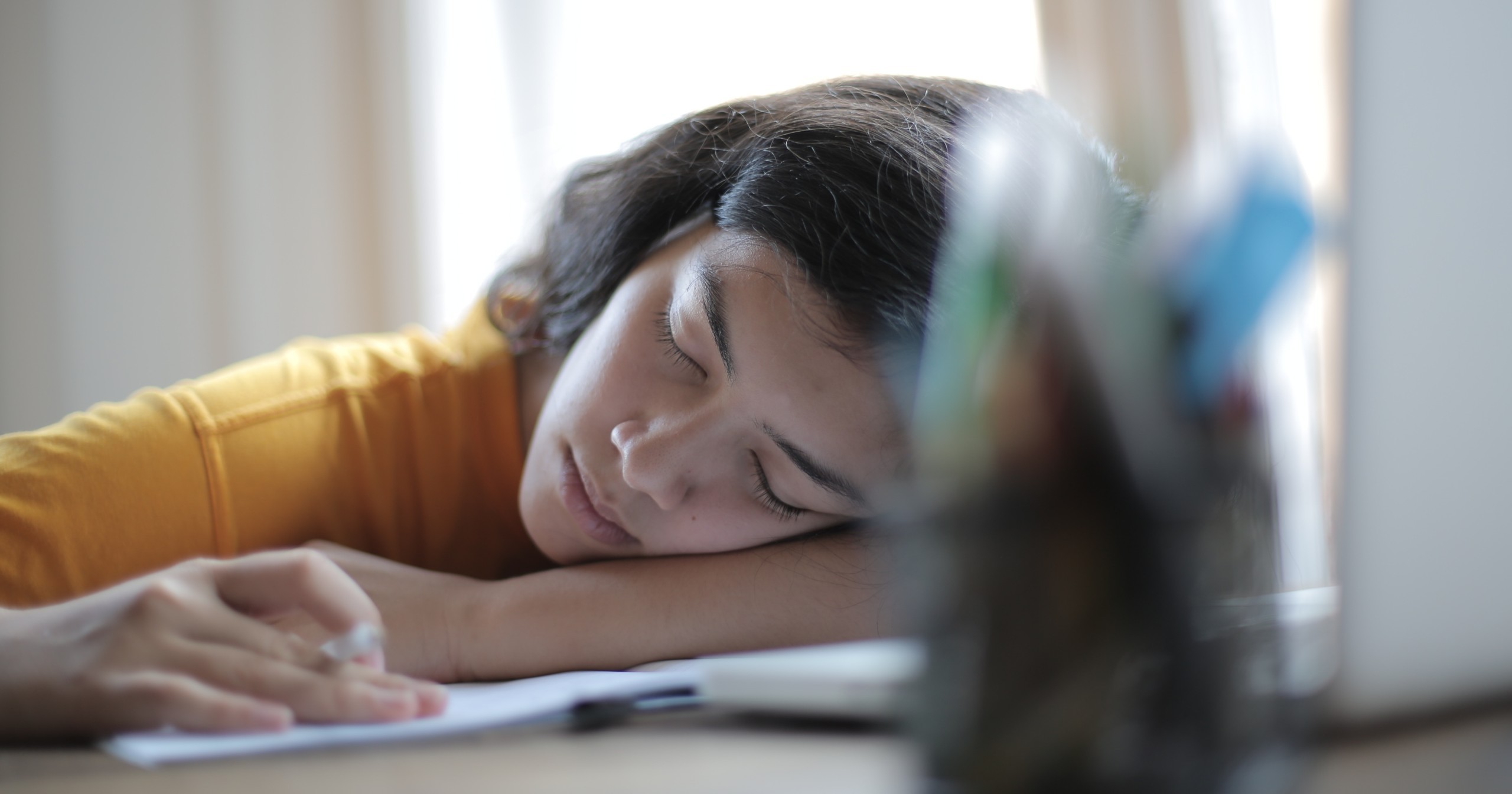
Sleeping is “the physical act that takes up one-third of our lives,” says Janan Ganesh, reflecting on his conversation with renowned sleep expert Matthew Walker.
In 2017, Walker published a book called Why We Sleep to shed some light on the importance of sleep—probably because most people don’t take it seriously for themselves and their families.
The consequences of insufficient sleep are disastrous.
While studying for his doctorate in neuroscience, Walker discovered a connection between sleep and subtypes of dementia, depression, heart disease, cancer, and Alzheimer’s. Yikes!
As you probably already know, sleep is important. But maybe you didn’t realize just how important it is—for you and for your children. Not only could insufficient sleep lead to health conditions later in life, as mentioned above, but it could also be causing your children to suffer now.
Healthline cites a new study by the American Academy of Pediatrics (AAP) 2019 National Conference and Exhibition, saying that “almost half of children in the United States don’t get the recommended 9 hours of sleep.”
This deprivation is affecting children’s overall health and academic progress.
Sleep isn’t just for babies
So, what is sleep?
That might seem like a silly question, but Walker thought it was valid. He says, “Sleep is not the absence of wakefulness. It is far more than that. Our nighttime sleep is an exquisitely complex, metabolically active, and deliberately ordered series of unique stages.”
Part of what influences these unique stages is an individual’s circadian rhythm. Basically, your body is guided by a master clock in your brain, composed of around 20,000 neurons. This master clock controls your body’s smaller biological clocks contained in nearly every organ and tissue, says the National Institute of General Medical Sciences.
According to OxfordSparks, this system of biological clocks is responsible for changes in your mental, physical, and hormonal stages throughout a 24-hour period—preparing you for sleep and making you ready to perform once you’re awake.
But there’s something else you should know about circadian rhythms—they change throughout your life.
Babies sleep a lot—even before they’re born! Starting in the third trimester of gestation, they begin experiencing REM sleep and have developed a circadian rhythm. According to Walker, REM sleep for babies is like “an internet service provider laying down high-speed fiber optic cable within the brain,” and their neurons are growing at an unprecedented rate!
As children grow, the importance of sleep doesn’t fade. According to the Sleep Foundation, a young child’s sleep affects
- Their level of happiness
- Alertness & attention
- Cognitive performance
- Resiliency
- Vocabulary building
- Learning ability
- Memory secretion
Then come the adolescent years—this is when circadian rhythms begin to change and teenage sleeping patterns shift.
If you’re a parent of a teen, you know it can be a chore getting them out of bed in the morning for school. Usually, we blame their morning attitude on typical teenage moodiness or rebellion…but what if there’s an unseen factor influencing their behavior?
“Before puberty, your body makes you sleepy around 8:00 or 9:00 pm. When puberty begins, this rhythm shifts a couple hours later. Now, your body tells you to go to sleep around 10:00 or 11:00 pm,” says UCLA Health. The challenge here is that teens still need at least 9 hours of sleep. And they still have to get up early for school in the morning. Hello, grumpiness…and possibly poor grades.
Sleep impacts academic performance
In recent years, researchers have discovered an indisputable connection between sleep quality and academic performance. Sleep dramatically influences the behavioral and cognitive factors that underpin academic function.
The Sleep Foundation tells us that children who don’t get enough rest are subject to:
- Diminished focus and impaired analytical capabilities
- Inadequate memory formation and trouble with sequential thinking
- Slowed creative thinking skills
Through a U.S. parent survey, researchers learned that “students who had the least amount of sleep were also reported to have the lowest grades. Those who averaged 8.1 hours a night scored mostly As, while those averaging 7.3 hours a night scored mostly Cs,” says Forbes.
Although slowed mental and behavioral functions impact a child’s ability to learn and perform well in school, another strong correlation between little sleep and poor grades is absenteeism.
Science Daily analyzed a study by North Carolina State University on the subject of school start times and their connection to students’ grades—and their likelihood of being late or absent from class.
The study looked at 19 different schools, 5 of which began classes at 8:05—the remaining 14 schools began at 7:25. In the end, Science Daily highlights, “the five schools that started at 8:05 had significantly lower rates of absenteeism and tardiness than the 14 schools that started at 7:25.”
Seattle Public Schools offers us another example. Administrators pushed class start time from 7:50 to 8:45. With this arrangement, students started getting an extra half hour of sleep each night, and their grades went up by 4.5%, relates Education Next.
Later school start times seem to promote better sleep habits for teenage students as their circadian rhythm shifts into adulthood—and therefore fuel overall health and success in their academic lives.
Fighting the anti-sleep monster
School start times aren’t the only factor in a child’s quantity and quality of sleep. If you’re a parent, you might be wondering what you can do to help your child get better sleep.
Of course, health problems and sleep disorders contribute to insufficient rest in children, and these require professional medical attention. But the majority of students aren’t battling a clinical condition—they’re battling the common problem of overstimulation.
Most of this barrage comes through screens.
Brad Huddleston, an internationally recognized speaker and author on the intertwined subjects of technology and culture, spoke with NWEF on the subject of technology addiction in children and adults—and its impact on sleep.
According to Huddleston, throughout the day, many things stimulate our brains. This daily load of experiences causes a buildup of chemicals and toxins in the brain that are released during sleep. After this release, our brains can enter a cycle of deep, REM sleep. This combination of processes causes us to be fresh and ready for optimal cognitive function the next day.
But here’s the scary thing.
The screens we use for work, school, and entertainment all have a surprisingly overstimulating impact on the brain, contributing to that buildup of toxins and chemicals, making it harder for us to enter deep sleep. This is especially true for children.
Huddleston tells us that in each stage of life, it takes a certain amount of time to enter deep sleep. If adults and children consume information from screens before bed, it’s much harder for them to enter deep sleep. “Be finished with all screen time 3 hours before bed for children and an hour for adults,” he advises.
Otherwise, deep sleep will be “pushed back”, and there’s a good chance you won’t wake up feeling refreshed.
Get Better Sleep!
If you want to create healthier sleeping habits for you and your family, make sure you’re doing these things:
- Have proper respect for the necessity of sleep
- If you have kids, make sure you show them the importance of sleep by modeling good sleep hygiene
- Create bedtime routines: go to bed and get up at the same time each day; practice reading a story or journaling in the evening to signal that it’s almost time to go to sleep
- Avoid screens and other blue light sources for several hours before bed
- Make sure your bedroom is comfortable and dark (cooler environments lead to better sleep)
- Don’t forget that other areas of your health factor into your quality of sleep, such as diet and exercise.
Even if you’ve gotten used to surviving on less sleep, the cost to your kids is too great. Start today and look forward to the benefits of a more well-rested family! None of you will regret it.
Check out Brad Huddleston’s full interview with NWEF here to learn more about how technology is impacting you and your children’s minds.
Want more resources on parenting and education? Visit nwef.org today!





[…] This translates into mental, emotional, and physical issues for many students. This stress also affects their sleep, both the amount of sleep and the quality of that […]
[…] health. Don’t sacrifice your regular sleeping hours for holiday zest. Children especially need their sleep and sticking to your family’s evening rituals will help ensure they enjoy adequate […]
[…] half the kids in the US aren’t getting enough sleep. When children lack sleep, almost everything about them is affected, […]